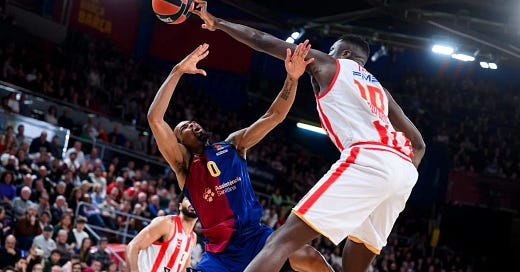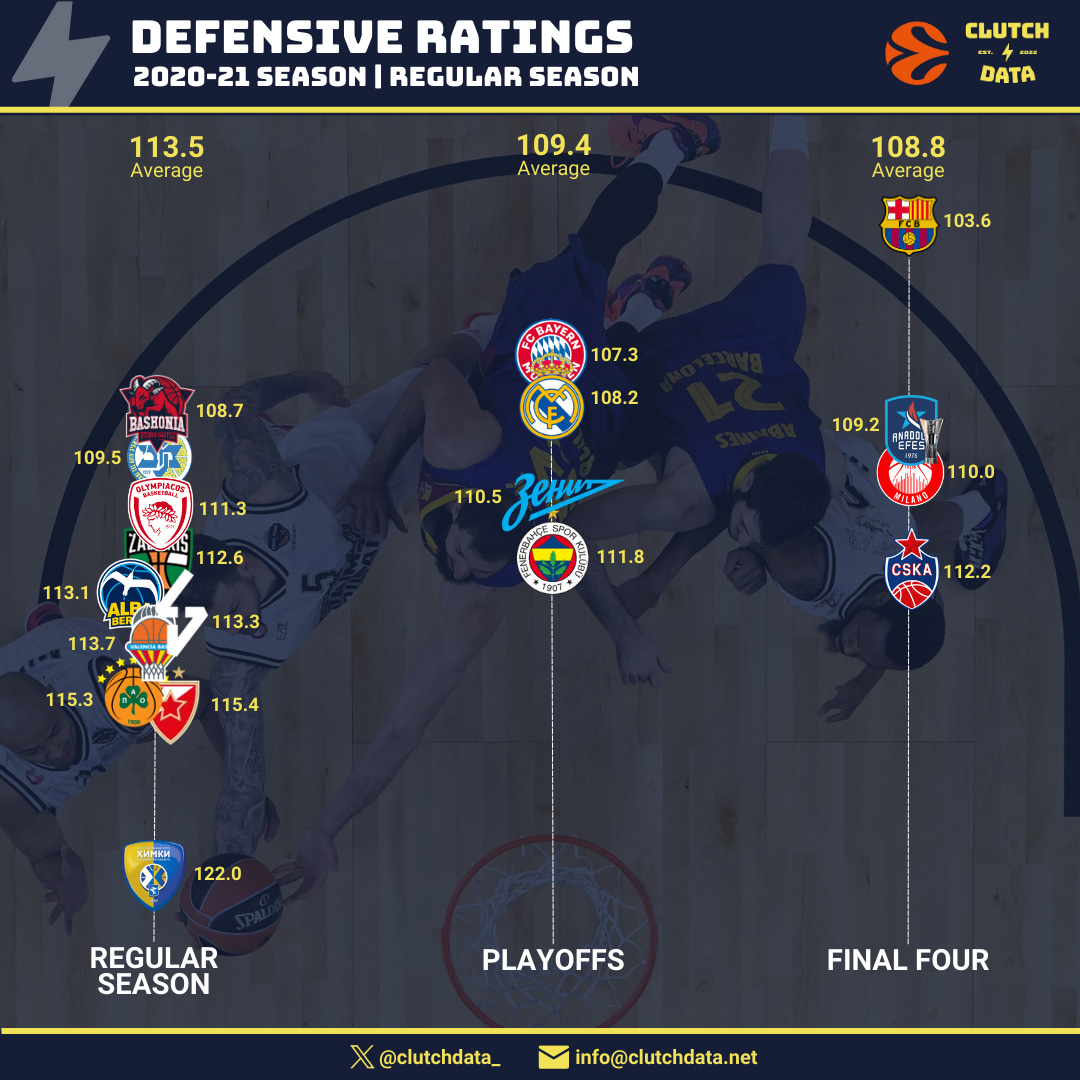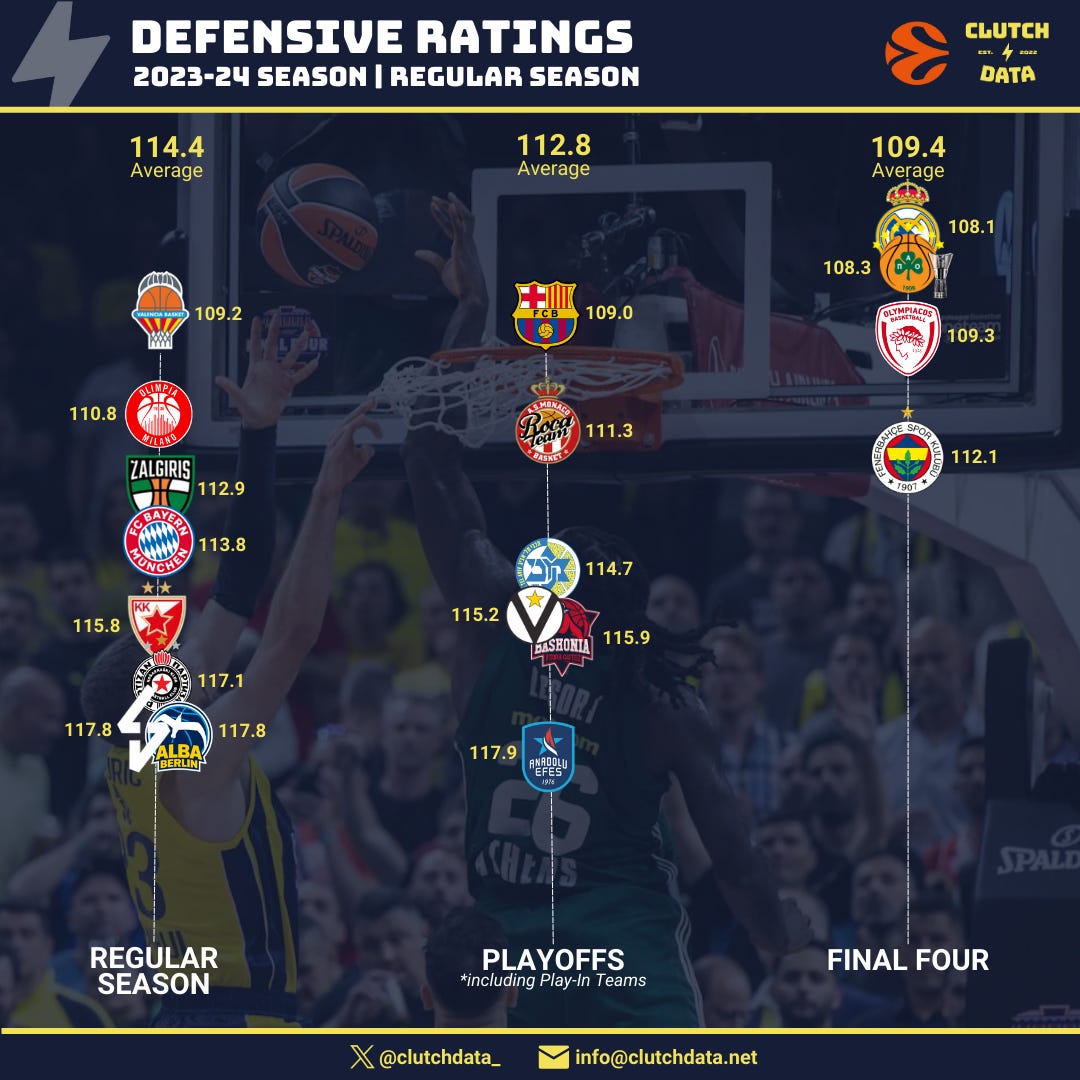In the world of basketball, the debate between offense and defense as the key to championship success has raged for decades. The Euroleague, Europe's premier basketball competition, provides an excellent laboratory to test this hypothesis. Using data from the 2020-21 to 2023-24 seasons, we can examine the relationship between defensive performance and team success, revealing patterns that may challenge conventional wisdom or confirm long-held beliefs.
The Methodology: Regular Season Metrics as Predictors
This analysis focuses on regular season defensive ratings (DRtg - Points Received per 100 Possessions played) as predictors of Playoff success. By using only Regular Season statistics, we establish a level playing field—all teams face a similar schedule, eliminating the bias that would come from including playoff numbers where teams face increasingly difficult competition. This approach allows us to assess whether Regular Season defensive excellence translates to postseason advancement.
The Defensive Advantage: A Clear Pattern
Analysis of the past four Euroleague seasons reveals a striking pattern: teams with elite regular season defensive ratings consistently advance further in the tournament than their defensive-challenged counterparts. This trend becomes particularly evident when examining the Defensive Ratings of teams that reached the Final Four compared to those that fell short.
Season-by-Season Analysis
2020 Season: Defense Sets the Foundation
In the 2020 season, a clear defensive hierarchy emerged:
The champion Anadolu Efes had the 5th-ranked defense (109.2) but the #1 offense (119.2), showing that elite offense can sometimes overcome good-but-not-elite defense.
Barcelona, with the league's best defense (103.6), reached the Final Four and finished 2nd.
All Final Four teams ranked in the top 11 for defensive rating.
The average defensive rating for Final Four teams was 108.8, significantly better than the league average of 111.6.
Notable outlier: CSKA reached the Final Four with the 11th-ranked defense (-112.2), compensating with the 2nd-best offense.
The efficiency landscape shows Barcelona dominating with a +10.1 net rating, combining the #1 defensive rating with a solid offensive performance. This balance between offense and defense proved to be a reliable formula for deep playoff runs.
2021 Season: The Exception That Proves the Rule
The 2021 season produced perhaps the most interesting case study:
Three of the four Final Four teams had top-5 defensive ratings (Real Madrid: 103.5, Olympiacos: 106.3, Barcelona: 106.9).
The champion Anadolu Efes was a major outlier, ranking 16th in defense (113.6) but 1st in offense (117.0).
The four Final Four teams averaged a defensive rating of 107.6, compared to the league average of 110.2.
Teams with balanced profiles were rewarded: Madrid and Barcelona both had top-5 offensive and defensive ratings.
Every playoff team except Anadolu Efes and Bayern Munich ranked in the top 10 defensively.
The 2021 season's defensive rating visualization illustrates this pattern clearly, with Final Four teams clustered toward the lower (better) defensive ratings, averaging 108.8 Defenisve Rating compared to 113.5 for teams that didn't advance beyond the regular season.
2022 Season: Defense Solidifies as the Key
The 2022 season showed the strongest correlation between defense and success:
All four Final Four teams ranked in the top 11 for defensive rating.
Olympiacos combined the league's best defense (106.6) with the 2nd-best offense (118.7) to reach the finals.
Champion Real Madrid had the 2nd-best defense (-108.3) and a top-5 offense.
Barcelona maintained its defensive excellence (3rd, -110.3) to reach another Final Four.
The Final Four teams averaged a defensive rating of -109.9, far better than non-Final Four teams.
Interesting case: Partizan had the best offense (120.7) but only the 17th-ranked defense (117.0) and lost in the playoffs.
The efficiency landscape for this season shows a clear pattern: teams in the upper-right quadrant (good offense, good defense) consistently advanced further than those with imbalanced profiles. Olympiacos stood out with a remarkable +12.1 net rating, built on the backbone of elite defense.
2023 Season: The Championship Formula Confirmed
The 2023 season continued to reinforce the pattern:
Champion Panathinaikos had the 2nd-best defensive rating (108.3) combined with a solid offensive profile.
Real Madrid posted the best defensive rating (108.1) and reached the Final Four again.
Olympiacos maintained their defensive identity (5th, 109.3) to reach the Final Four.
All Final Four teams ranked in the top 8 defensively.
The most efficient defensive teams consistently advanced further: the average defensive rating for Final Four teams was 109.5, compared to 114.7 for teams that didn't advance past the regular season.
The defensive rating visualizations for 2023 show the pronounced gap between Final Four teams (average 109.4 DRtg) and regular season teams (average 114.4 DRtg), further solidifying the connection between defensive prowess and playoff success.
The Defensive Rating Distribution
The defensive rating visualizations for each season reveal a consistent pattern:
Teams with lower (better) defensive ratings cluster toward the right side of the graph (Final Four)
Teams with higher (worse) defensive ratings tend to be found on the left side (didn't advance beyond regular season)
The average DRtg improves steadily as we move from regular season-only teams to playoff teams to Final Four teams
This clear stratification across multiple seasons provides compelling evidence that regular season defensive rating serves as a strong predictor of postseason success.
Elite Offensive Outliers
While defense shows the strongest correlation with success, we must acknowledge the exceptions:
Anadolu Efes in 2021 won the championship with the 16th-ranked defense but #1 offense
CSKA in 2020 reached the Final Four with the 11th-ranked defense but 2nd-ranked offense
Partizan in 2022 had the best offense (120.7) but was eliminated in the playoffs due to poor defense (17th)
These outliers suggest that while exceptional offensive firepower can occasionally overcome defensive deficiencies, such cases remain rare. Of the 16 teams that reached the Final Four across these four seasons, only 3 ranked outside the top 8 in defensive rating.
The Efficiency Landscape: Balanced Teams Thrive
The efficiency landscape charts provide additional context by plotting teams according to both offensive and defensive efficiency. Teams in the upper-right quadrant—those with above-average performance on both ends of the floor—consistently advance to the Final Four.
Across all four seasons, 13 of the 16 Final Four teams (81%) had positive ratings on both offense and defense. This balanced approach appears to be the most reliable path to championship contention.
Key Observations Across All Seasons
Consistent Pattern: In all four seasons, the Final Four teams had significantly better defensive ratings than the league average.
Championship Formula: 3 of 4 champions ranked in the top 3 defensively. The only exception (Anadolu Efes in 2021) compensated with the #1 offense.
Final Four Qualification: 13 out of 16 Final Four teams across these seasons ranked in the top 8 defensively.
Balance Matters: Teams with both elite defense and competent offense (like Barcelona, Real Madrid, and Olympiacos) consistently reached the later stages of the competition.
The Outlier Effect: Only one team with a defensive rating outside the top 10 (IST in 2021) managed to win the championship, and they did so with the league's most potent offense.
Conclusion: Defense as a Foundation for Success
While offensive firepower certainly matters, the data from the past four Euroleague seasons strongly suggests that defensive excellence provides a more reliable foundation for championship success. Teams with top-tier defensive ratings in the regular season consistently advance further in the tournament, and those that combine elite defense with competent offense form the backbone of Final Four participants.
The patterns observed across these seasons reinforce the old adage that "defense wins championships"—at least in the Euroleague. Teams aspiring to championship contention would be wise to prioritize defensive development and consistency, even as they pursue offensive improvement.
For fans and analysts alike, regular season defensive rating has proven to be a remarkably reliable predictor of playoff success. As we look ahead to future seasons, tracking defensive performance during the regular campaign may offer the clearest window into identifying genuine championship contenders before the playoffs even begin.













